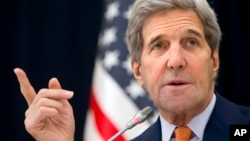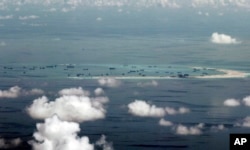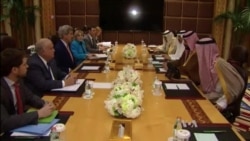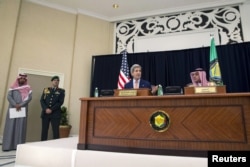U.S. Secretary of State John Kerry is in Laos at the start of a tour of Asia that will also take him to Cambodia and China.
Kerry arrived Sunday in the capital, Vientiane for a two day visit. Communist Laos is the current head of the Association of Southeast Asian Nations, or ASEAN.
The group’s members have concerns about China’s growing assertiveness over competing claims in the South China Sea where China is constructing man-made islands.
President Barack Obama will host ASEAN members in California next month.
Kerry is expected in his trip to Laos to stress the importance of the bloc presenting a united front in response to China’s claims.
The U.S. and governments with rival claims in the South China Sea say China’s action threaten regional stability.
Kerry heads to Cambodia Monday night where he with meet with Hun Sen, Asia’s longest serving prime minister.
Kerry arrived in Asia from Saudi Arabia, where he reiterated that the two nations have as strong a friendship as ever.
Kerry said “nothing has changed” as a result of the agreement the U.S. and five other world powers made with Iran to curb its nuclear program in exchange for lifting billions of dollars in sanctions.
WATCH: Video report by Pam Dockins in Riyadh
His comments were similar to ones he made Saturday as he met with Saudi and other Gulf officials in Riyadh.
The talks came on the heels of a flurry of Iran-related activity, including implementation of the nuclear deal, Tehran’s temporary detention, and release of 10 U.S. sailors and a negotiated swap that resulted in freedom for four Americans jailed in Iran. A fifth American was released by Tehran around the same time last week.
In spite of these developments, Saudi Foreign Minister Adel al-Jubeir said, “I don’t see a coming together of the United States and Iran.”
Jubeir commented as he and Kerry sat side-by-side in a Saturday news conference.
“I don’t believe the United States is under any illusion as to what type of government Iran is,” he added.
Although implementation has brought Iran relief from nuclear-related sanctions, it is still under U.S. penalties for activities including human rights violations and support of terrorist groups. Also, shortly after implementation of the nuclear deal, Washington imposed new sanctions on Iran’s ballistic missile program.
Sanctions relief
But some say the sanctions relief from implementation that, according to U.S. estimates, gives Tehran direct access to at least $55 billion in previously frozen assets, could empower Iran.
“Iranians feel confident that they are being brought back into the international community and that their role in the region and the world will be better recognizes, particularly by the U.S. and Europe, said Atlantic Council Middle East analyst Nabeel Khoury.
“This bothers Saudi Arabia because they don’t trust Iran,” he said.
In an interview with CNN, Iranian Foreign Minister Mohammad Javad Zarif expressed a similar sentiment.
“We believe that Iran and Saudi Arabia can be two important players who can accommodate each other,” in the region, he said.
But he added, “Unfortunately, the Saudis have had the illusion that backed by their Western allies, they could push Iran out of the equation in the region.”
Saudi Arabia-Iran tensions
Tensions heightened between Saudi Arabia, the dominant Sunni country in the region, and Shi’ite-led Iran following this month’s Saudi execution of Sheikh Nimr al-Nimr, a prominent Shi’ite cleric. Protesters responded by storming Saudi missions in Tehran - a move that prompted Saudi Arabia to cut ties with Iran.
Saudi Arabia may have been trying to send out a broader message by executing the cleric, said Jonathan Schanzer, a Middle Eastern studies scholar at the Foundation for Defense of Democracies.
“We [the United States] have made it worse,” said Schanzer. “The Saudis feel less secure and now they are taking matters into their own hands,” he said.








